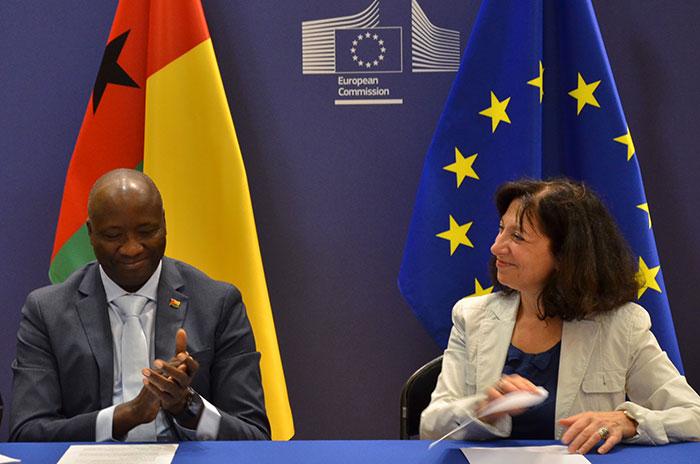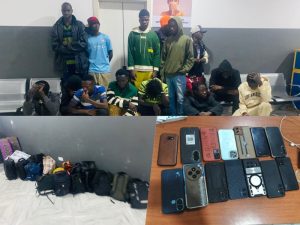Gambiaj.com – The European Union (EU) and Guinea-Bissau have signed a new protocol under the Sustainable Fisheries Partnership Agreement (SFPA), allowing EU vessels to fish in Guinea-Bissau’s waters for a period of five years.
The protocol, signed by Charlina Vitcheva, Director-General for Maritime Affairs and Fisheries of the EU, and Mário Musante da Silva Loureiro, Minister of Fisheries and Maritime Economy of Guinea-Bissau, seeks to promote the sustainable development of the West African nation’s fisheries sector while ensuring environmental conservation.
The EU’s financial contribution to the new protocol is valued at €85 million over the five-year period, with €17 million allocated annually. Of this amount, €4.5 million each year will be earmarked for bolstering Guinea-Bissau’s capacity to manage, control, and surveil its marine resources, as well as for supporting local fishing communities. In addition to the EU’s contribution, EU shipowners will pay license and capture fees, bringing the overall financial commitment to over €100 million.
The multi-species agreement, one of two active EU agreements in West Africa, covers a range of marine life, including tuna, shrimps, cephalopods, and demersal species. EU vessels, particularly from Spain, Portugal, Italy, Greece, and France, will be able to fish in Guinea-Bissau’s exclusive economic zone, which is a vital part of the Atlantic Ocean.
Fostering Sustainable Fisheries and the Blue Economy
The new protocol aligns with both the EU’s partnership policies and Guinea-Bissau’s strategic objectives for sustainable fisheries management. By promoting the development of the national fisheries sector, the protocol is expected to create significant economic value, generate employment opportunities, and integrate local fishermen into EU operations. Local observers will also be placed on EU vessels to monitor activities and ensure compliance with international fishing standards.
The agreement highlights the EU’s commitment to advancing sustainable fishing practices and addressing illegal, unreported, and unregulated (IUU) fishing in the region. It introduces provisions aimed at improving fisheries governance, enhancing data protection, and reinforcing sectoral support. The protocol also emphasizes scientific capacity building, observation and management of marine environments, and marine protected areas in Guinea-Bissau.
Economic and Environmental Impact
Beyond financial support, the protocol aims to strengthen Guinea-Bissau’s fisheries governance by increasing transparency, promoting better working conditions for local fishers aboard EU vessels, and enhancing cooperation between the EU and Guinea-Bissau in technical, economic, and scientific areas. These efforts will contribute to creating a level playing field, ensuring transparency, and advancing the sustainable management of marine resources in line with international standards.
For Guinea-Bissau, the agreement will not only contribute to economic growth through added jobs and improved infrastructure but also support the development of its blue economy. The EU’s commitment to scientific research and environmental conservation will play a key role in preserving the region’s marine biodiversity.
Next Steps
The new protocol will be provisionally applied starting on 18 September 2024, allowing EU vessels to resume fishing activities in Guinea-Bissau’s waters while the ratification process is completed by both parties. For the EU, this includes securing the consent of the European Parliament.
This agreement marks a continued partnership that began in 2007, with both parties working closely on scientific assessments and fisheries management in collaboration with regional bodies like the International Commission for the Conservation of Atlantic Tunas (ICCAT). The new protocol builds on this foundation, with added provisions to ensure a more sustainable and cooperative future for both EU operators and the people of Guinea-Bissau.










